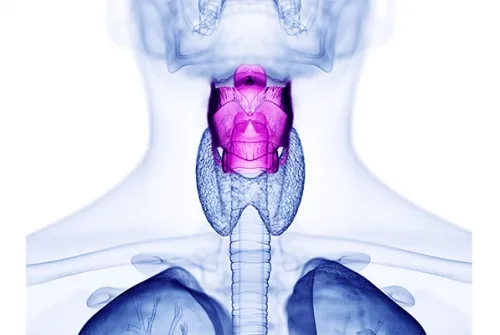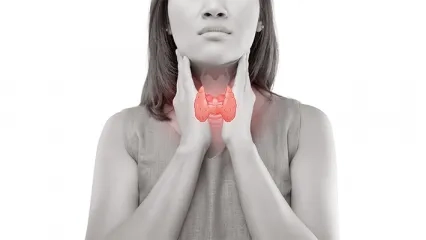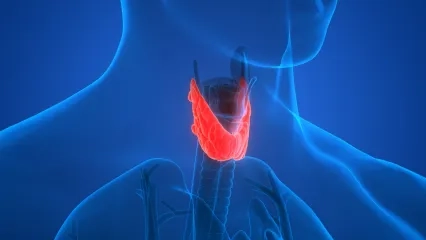Alo Yeditepe
Alo Yeditepe
Thyroid Diseases
How Does the Thyroid Gland Work?
The thyroid gland takes the iodine taken into the body with nutrients and combines it with the tyrosine protein and converts it into thyroid hormones: T3 and T4. T3 and T4 are released into the blood and sent to all cells to control the metabolism. 80% of the hormones produced in the thyroid gland are T4 and 20% are T3. In contrast, T3 is 4 times stronger than T4. The thyroid gland is under the control of the pituitary gland. Thyroid hormone levels in the blood release the pituitary gland's TSH hormone into the blood and stimulate the thyroid gland to secrete more hormones.
The pituitary gland is also under the control of the hypothalamus. The secretion of TSH is controlled by the hormone TRH.
What Are Common Thyroid Problems?
Goiter: This is the significant enlargement of the thyroid gland. It can reach a size that can be seen from the outside. It usually does not cause hormonal disorders and carries no risk of cancer. It needs to be removed surgically, as it is mostly inhaled or esophageal pressure.
Thyroid cancer: It is rare in the community. There are four types. It usually does not cause symptoms, but may include hoarseness, difficulty swallowing, chest pain, or a neck mass. The chance of full treatment is high.
Thyroid nodules: It is the abnormal mass growth in the thyroid gland. Most of them are benign. Only 5 percent are at risk of cancer. It may cause a lack or excess of thyroid hormone. Most of them do not need treatment.
Hyperthyroidism: It refers to the overwork of the thyroid gland. The feeling of warmth, weight loss, palpitations, and tremors in the hands due to the increase in metabolism. It can be caused by different reasons. It usually responds well to treatment.
Hypothyroidism: It is the state of decreased thyroid hormone production. It is usually diagnosed years after the disease begins. It may be caused by different situations. The thyroxine hormone is used for its treatment. It is usually a persistent disease.
Thyroiditis: It refers to non-microbial inflammation of the thyroid gland. In addition to complaints such as fever and neck pain, it may cause hypo and hyperthyroidism. There are numerous reasons.
Symptoms That May Signal Thyroid Diseases
- Periodic increase and decrease in body temperature
Hyperthyroidism provides a higher metabolic rate by speeding up your normal body processes, which can lead to faster burning of energy and increased body temperature. People with hyperthyroidism may sweat excessively. Hypothyroidism, on the other hand, slows your body's metabolic rate and can cause a cold as your body temperature may drop.
- Thinning of the body skin and getting a rough appearance
The thyroid also controls the rate at which the skin sheds. Especially in thyroid patients with high hormone activity, the skin sheds a little faster and becomes smooth frequently. However, it causes thin skin. Other skin problems that may be caused by hyperthyroidism are feeling skin moist or hot, and an increase in redness of the face and hands. The low active thyroid slows down the rate of skin cell production, making the skin
rougher. In patients with hypothyroidism, an orange-yellow color tone may be seen on the skin due to feeling cold and pale, wounds that do not heal for a long time, and carotenemia.
- Lack of energy and tiredness
Hyperthyroidism and hypothyroidism are completely different ways in which the body expends its energy, but both can seriously shake the human body. Low-active thyroid patients don't want to do almost anything. However, an overactive thyroid can result in severe energy breakdowns, as your metabolism speeds up too much from time to time. Hyperthyroidism causes rapid fatigue as it greatly increases the heart rate.
- Changes in mood
An overactive thyroid may make changes to your emotions. Hyperthyroidism may be linked to anxiety, extreme emotionality, or even psychosis. However, hypothyroidism is associated with feelings of depression and can distract the person from social life. Some people can also live with forgetfulness. Therefore, it is necessary to consider the mood changes that will occur without a reason.
- Excessive weight gain or inability to gain weight
While hyperthyroidism is related to weight loss, it can also cause an increased appetite. For this reason, even people with a rapid metabolic rate may experience weight gain. Similarly, in hypothyroidism, which is associated with reduced appetite, weight loss occurs when the desire to eat is reduced despite the slowing of the metabolism. Therefore, it is necessary to doubt the thyroid in all changes that may occur in weight control.
This content was prepared by Yeditepe University Hospitals Medical Editorial Board.
”
See Also
- What is a Parathyroid Adenoma? Symptoms and Treatment
- What is Calcitonin Hormone? Calcitonin Hormone Deficiency
- If the Size of the Thyroid Nodule is Over 4 cm, Be Cautious!
- How Does High Calcium in Blood Cause Complaints?
- A First in the Literature: Parathyroid Cell Obtained from Thyroid Stem Cell
- Diagnosis in Thyroid Diseases
- Assessment of Hyperthyroidism
- Hashimoto's Thyroid Disease
- Thyroid Tumor (Cancer)
- Graves' Disease
- Thyroid Nodules
- Thyroid Surgery
- Assessment of Hypothyroidism
- What is the Harm of High Calcium in the Blood?
- Frequently Asked Questions in Thyroid Diseases
- Atomic Therapy (Radioactive Iodine Therapy)
- Which Thyroid Nodule Can Be Treated Without Surgery?
- She Was Relieved of Her Pain When the Missing Parathyroid Gland Was Found in The Chest Cavity
- Thyroid Storm Can Turn Life Upside Down
- Recovered From Thyroid Nodule with Needle Melting Method
- Stress Triggers Thyroid Diseases; These Occupations Are At Risk!
- Turkish Physician Developed a Novel Method for Parathyroid Transplant
- What Should Be Considered After Parathyroid Surgery?
- Parathyroid Diseases and Treatment
- They Said It Was Thyroid Cancer, But It Turned Out to Be Parathyroid Adenoma!
- The Frequency of Thyroid Nodules and Thyroid Cancer in Young People is Increasing!
- Thyroid Cancer Treatment Is Possible Without Removing The Entire Thyroid Gland
- Thyroid Storm
- T4 Hormone in 13 Headings
- Questions About Thyroid Diseases
- Goiter (Thyroid Gland) Biopsy
- Radiofrequency Therapy in Thyroid Nodules
- What Is Autoimmune Hypoparathyroidism or Hypocalcemia?
- What Is The Loss of Low Calcium Level in Blood?
- What Is The Symptoms of Calcium Level Elevation (Hypercalcemia)?
- How It Is Made The Parathyroid Adenoma Operation?
- What Is Parathyroid Hyperplasia?
- Parathyroid Tumors
- What Are The Parathyroid Glands?
- The Incidence of Thyroid Cancer Has Increased! There is Turkey in the Research!
- Key Surgery Performed In Turkish Hospital For First Time
Alo Yeditepe






